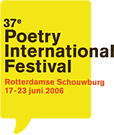Poet
|
Omar Pérez Lopez 1964-... country: Cuba language: Spanish |
Omar Pérez López (Cuba, 1964) studied English language and literature at the University of Havana and Italian language and letters in Siena, Italy. He has translated work of Dylan Thomas, Dante Alighieri and Egenio Montale, and made his début as a poet with the collection Algo de lo Sagrado in 1996. His poems have been translated into German, English and French. Omar Pérez López, poet and translator, was born in Havana in 1964. His first volume of poems Algo de lo sagrado (‘Something sacred’) was published in 1996, and his work has appeared in anthologies at home and abroad. In Cuba he contributes to literary magazines such as La Gaceta de Cuba and El Caimán Barbudo. In 1998 he published his collected poems 1994-98 under the title Oíste hablar el gato de pelea? (‘Have you heard the fighting cat talk?’) Pérez seems to be the kind of person who loves to turn everything upside down, to question established beliefs, to take the mickey out of things. ‘He wrote with the intention of doing damage’ No definitions of poetry: ‘Some call it the Game, others the Flower, or the Mirror. All agree that it is about an instrument of mutation, like a fan turning into a sword, then into a branch, a dead one or a flowering one, then into a flame and silence. A travelling fan.’ (...) ‘The child comes to the Island in order to mutate, but in waves of the amniotic fluid ocean it forgets everything. When the child arrives on the island, it has no purpose. Later, it learns: praxis, poiesis, Kyrie eleison, benedictus qui venit in nomine domini. I can´t give you anything but love, baby, Il faut être absolument sincère, cubanness is love, the women call the shots.’ (...) ‘It is a technique of sincerity which encompasses all techniques, said the man on the island mountain. "I want to learn it, too," said the Child, jumping to its feet. "It’s quite easy. Fix the improvisable. A kiss, for instance. Improvise the fixed. An island mountain, for instance. Kill the criterium." "And what about my thoughts?" exclaimed the Child. "They serve no purpose. Consider them to be insects on the bark of a growing tree. That is the glory of thought, if you want to know." "I must answer questions," mused the Child. "Don’t answer any questions. Don’t respond to truisms. Now another Child is waiting for you. Teach it what you have forgotten." Author: Mariolein Sabarte Belacortu Translated by Ko Kooman Poets: |


